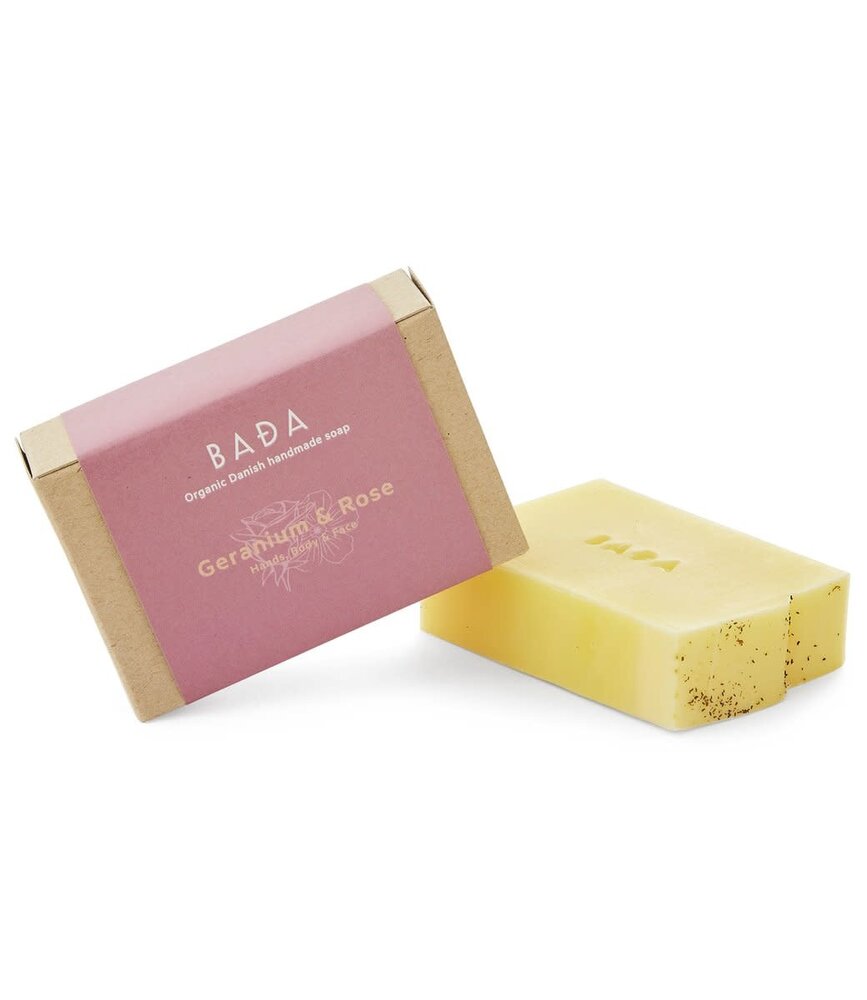Bada Organic Soap Geranium and Rose Organic Danish Handmade Soap


A delicious 100% organic hand soap with Geranium and Rose from the Danish micro soap factory BADA. The Bada hand soap is a mild and moisturizing soap for your hands, body and face. The soap has an abundance of oils and leaves the skin clean and soft. It is a creamy and luxurious soap that smells like natural rose.
BADA hand soap Geranium and Rose - 100 grams
- Organic geranium oil
- Organic rose leafs
- Eco-certified coconut oil
- Organic cold pressed rapeseed oil grown at Stevns
- and nothing else.
Geranium oil is known for its astringent, anti-inflammatory and sebum-regulating properties. Coconut oil is antibacterial and very moisturizing. Rapeseed oil nourishes and moisturizes the skin. The cold-pressed rapeseed oil naturally has a high content of vitamin E, which has a soothing and protective effect on the skin.
The hand soap is:
- Plastic-free
- vegan
- 100% organic
- Palm oil free
The packaging is made from 100% unbleached recycled fibres. Paper and printed matter have a Nordic Ecolabel and are approved for foodstuffs.
How do you store the BADA soap after use?
Maybe a strange question, but after all the liquid soap bottles and solid soaps with a lot of preservatives, we have forgotten how to deal with delicious organic soap.
It's not difficult. The most important thing is that the soap can dry well after use, which means that it must be placed in a soap dish / soap holder, where the water can drain. He should not be able to stand with his feet in the water.
Many people have heard the rumor about solid soap and bacteria. But that is not true. As long as the soap can lie dry, everything dies. In return, you can get rid of preservatives and other unwanted chemicals in soap. In liquid soap, up to 90% of the content is water, which is why preservatives are important to prevent the soap from rotting. A solid soap is a really good way to avoid a lot of plastic packaging.
Production of the BADA soap
All BADA soaps are produced in their own micro-soap factory in Roskilde.
BADA's soap is based on 100% organic and natural ingredients - without preservatives and endocrine disrupting substances. The fragrance comes from the organic herbs and the organic aesthetic oils. The soap is handmade and is completely vegetable and organic. Bada attaches great importance to quality, good workmanship and durability.
The soaps are made in a process called "cold saponification," a method people have used for thousands of years. Cold saponification makes the soap soft, creamy and gentle on the skin as some unsaponified oil remains in the soap. All soaps are approved according to EU cosmetics regulations
Ingredients BADA soap
The main ingredients in BADA soaps are Danish organic cold-pressed rapeseed oil, grown in Grønninggaard in Stevns. Organic cold-pressed rapeseed oil naturally has a high content of vitamin E, which has a soothing and protective effect on the skin. The rapeseed oil also gives the soap a beautiful golden color.
In addition, the BADA soaps contain organic coconut oil. The coconut oil is Ecocert certified and is grown and harvested under sustainable and organic conditions on small family farms in the Philippines. Coconut oil is antibacterial, very moisturizing and gives the soap a creamy and dense lather.
In addition, organic oils and dried organic herbs are used in the soaps.
No palm oil is used for the BADA soaps. Palm oil is the most widely used vegetable oil in the world today and is also found in many of the everyday goods that can be bought, including soap.
Environmentally aware
BADA strives to provide alternatives to synthetic products and plastic packaging. BADA's products should be the natural and easy choice for consumers - products that do not add artificial actives to the health and body of the users.
BADA's uncompromising approach means that production methods, packaging concepts, supply chain and partnerships must be sustainable in all respects. The raw materials are organic and, where available, locally produced - even if this entails higher production costs and lower yields per product than a one-sided focus on low production prices.
Solid soap affects the climate 400-500 times less than liquid soap in plastic bottles.
If you want to further reduce the packaging, it is also possible to switch off the soap box itself.
The BADA soap is packed in cardboard without the use of plastic. The soap boxes are made from 100% unbleached recycled fibers and produced in Denmark. The paper for the cover bears the Swan label and the colors are food-approved.
BADA also recycles all cardboard boxes and fillings. Should they have to use new boxes, these are FSC labeled and sealed with environmentally friendly paper tape.
BADA supports the environmental organization @Plastic Change, which fights for green legislation.
Read more about Plastic Change: www.plasticchange.dk
Back from liquid soap to solid soap
Over the past 30 years, many consumers have replaced solid soap with liquid soap. Similarly, the market has shifted from soaps based on natural ingredients to synthetic soaps that contain preservatives, which can cause allergic reactions, be endocrine disruptors and, if they end up in the sea, harm the environment.
In addition to these chemical impact on the water environment, 8-10 million tons of plastic per year also enter the sea. Packaging for consumer goods is an important contributor to this pollution. Disposable liquid soap containers are among the contributors – even though there are good sustainable alternatives on the market.
In addition to the direct negative effects of using synthetic soaps wrapped in plastic, many retail products are produced far from the consumer and far from the suppliers of the ingredients. Factors that create an unnecessary carbon footprint for a relatively simple product like soap.














